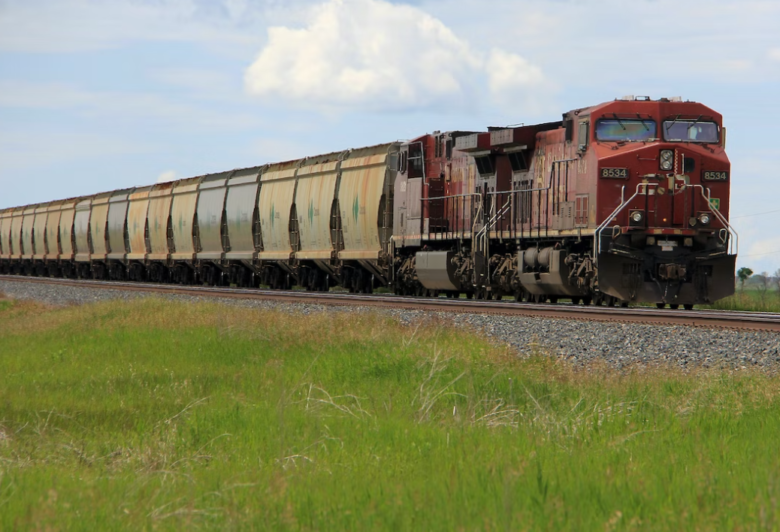Biden Admin Weighs California’s Latest Green Gambit That Could Set Off Chain

The Biden administration could allow California to implement a rule designed to push green locomotives, but a growing list of stakeholders are warning that the regulation would severely impact the state’s economy and the national rail industry.
The Environmental Protection Agency (EPA) could soon determine whether it will allow the California Air Resources Board (CARB) to move forward with a state regulation that would ban the use of locomotives that are more than 23 years past their manufacturing date unless they run using zero-emissions technology, according to Progressive Railroading.
The rule could disrupt supply chains and saddle the state’s railway industry with huge new costs that would flow to consumers, with the effects of the rule potentially spilling out in other parts of the country, according to numerous trade groups, lawmakers and policy experts who believe the Biden administration should reject CARB’s request.
CARB passed the locomotive rule in April 2023, but the agency must first receive the EPA’s permission before it enacts a regulation that goes above and beyond federal rules, according to the EPA’s Federal Register entry on the request. Monday was the last day to file comments with the EPA about the matter, signaling that a final determination could be coming soon.
“When you look at regulations in California, they’re being promulgated by people who don’t really understand the ramifications of what they’re requiring,” Edward Ring, a veteran of the railroad industry who is now the director of water and energy policy for the California Policy Center, told the Daily Caller News Foundation. “CARB is asking for something — zero-emissions locomotives — that do not yet exist. And what’s going to happen is it’s going to dramatically raise the cost of shipping anywhere in California, and that’s going to have a ripple effect across the country. This is another example of California’s environmentalist regulations raising the cost of living.”
The rule for locomotives would take effect in 2030, assuming EPA allows CARB to proceed. Some of the rule’s critics say that timeline is too tight to meet given the current lack of dependable, affordable zero-emissions technology available for locomotives on the market.
Moreover, the rule also would require locomotive operators to pay into their own trust accounts to fund the acquisition of zero-emissions locomotives and related infrastructure, according to CARB. The payment structure requires operators to contribute more into the accounts for operating dirtier locomotives than they have to put up for running cleaner ones.
Because many other states adhere to CARB guidelines, the EPA’s approval could set off a chain reaction expanding the impact of the rule well beyond California’s borders, according to Ted Greener, vice president of public affairs for the Association of American Railroads (AAR).
“If EPA approves the waiver the rule becomes a national matter on the first day. Roughly 65% of the locomotive fleet goes in and out of California and almost all of the freight rail traffic that moves in the state of California traverses state lines,” Ted Greener, vice president of public affairs for the Association of American Railroads (AAR), told the DCNF. “Moreover, EPA granting the waiver enables other states to opt-in and replicate the regulation in full – including the phase out dates and the spending accounts. Such a balkanized system would be unspeakably costly, but also disruptive to the flow of goods.”
A “large number” of locomotives would be impacted by the rule, Greener told the DCNF. Typically, locomotives have a lifespan ranging from 30 to 50 years, and they are regularly upgraded or otherwise modified to be more fuel-efficient, Greener added.
Other rail industry interest groups, such as the American Short Line and Railroad Association (ASLRRA), have also opposed the rule.
“While the spirit behind this rule is consistent with short lines’ environmental commitment, the rule itself is impractical, unworkable, and simply not feasible for most short lines,” Chuck Baker, president of ASLRRA, said of CARB’s rule in May 2023. “In addition, this rulemaking does not acknowledge the impact of the elimination of some short line rail service to Californians … Short lines would not in fact be able to pass on these costs to their customers and some of them would be eliminated by this rule.”
For its part, CARB downplays most of these criticisms and concerns.
“Despite the availability of cleaner options, railroad companies have failed to make investments to replace their outdated, dirty locomotives that contribute to the state’s air quality problems and endanger the lives and health of Californians,” a CARB spokesperson told the DCNF. “Passenger vehicles, heavy-duty trucks, ocean-going vessels, heavy off-road equipment, small off-road engines used in landscaping, among other…
Read More: Biden Admin Weighs California’s Latest Green Gambit That Could Set Off Chain

